We may earn a commission from links on our site, but this doesn’t affect our reviews. Learn more.
Hedge With Crypto is an independent publisher that provides objective and free content. Articles on our site may include links to our partners. If you click on these links, we may earn a commission. However, our editorial content remains unbiased, reflecting our own opinions or the general information available. For more information on our company policies, read the Affiliate Disclosure, Privacy Policy, and Terms & Conditions.
7 Best P2P Crypto Exchanges
Hedge With Crypto aims to publish information that is factual and accurate as of the date of publication. For specific information about a cryptocurrency exchange or trading platform please visit that provider’s website. This information is general in nature and is for education purposes only. Hedge With Crypto does not provide financial advice nor does it take into account your personal financial situation. We encourage you to seek financial advice from an independent financial advisor where appropriate and make your own enquiries.
TABLE OF CONTENTS
Based on our reviews and comparisons, these are the best Peer-to-Peer (P2P) platforms to trade cryptocurrencies directly with other traders:
- Binance (best overall P2P crypto exchange)
- Bybit (best crypto P2P option for zero fees)
- KuCoin (best P2P for altcoins)
- Huobi (best for ease of use)
- OKX (best P2P market for fiat currency)
- Paxful (best for P2P payment methods)
- WazirX (best P2P platform with transaction IDs)
Featured Partner
Kraken
Crypto platform for smarter investing.
4.8 out of 5.0
Kraken is a US-based crypto trading platform that is best suited for users who need crypto-to-fiat and crypto-to-crypto trading facilities. One of the most regulated and security-focused exchanges, Kraken is a great choice.
200+
USD, GBP, EUR, CAD, CHF, JPY & AUD
Bank transfer, SWIFT, SEPA, debit and credit card
0.16% (maker) and 0.26% (taker)
Best P2P Cryptocurrency Exchanges Compared
| P2P Platform | Supported Payment Methods | Minimum Trade Amount | Platform Fees |
|---|---|---|---|
| Binance P2P | 100+ | $10 | None |
| Bybit P2P | 50+ | $10 | None |
| KuCoin P2P | 20+ | $20 | None |
| Huobi P2P | 59+ | $100 | None |
| Paxful | 350+ | $10 | 0.5% to 5% |
| WarizX | 20 | $20 | None |
| OKX | Depends on users’ region | $20 | None |
List of the Best P2P Exchanges
With increased crypto activity, P2P trading has recorded sky-high interest. In this section, we list some of the best P2P exchanges for this year.
1. Binance P2P
Binance is our top pick for the best P2P crypto exchanges. Launched in early 2020, the Binance P2P has become a mainstay in the crypto space with billions of dollars worth of trade executed daily given its top spot on the crypto trading ranks.
Since it launched in 2017, Binance has grown to become one of the largest and premier cryptocurrency exchanges, attracting millions of traders worldwide. The exchange is also recognized for its low transaction fees. Trading fees on Binance start from 0% to 0.1% and are one of the cheapest in the industry.
-
Trading Fees:
0.1% (spot) and 0.02% / 0.04% (Futures)
-
Currency:
USD, EUR, GBP, AUD, CAD, +22 Others
-
Country:
Global (USA allowed via Binance.US)
-
Promotion:
Up to $100 welcome bonus
P2P trading is one of the cheapest and most straightforward payment methods to buy cryptocurrency on the Binance platform. Binance P2P allows investors to buy their favorite cryptocurrencies using their local currencies. The system works as an ad system where traders can post their crypto of choice, price, and preferred payment options like digital wallets and SEPA transfers.
The Binance P2P marketplace is free for both sellers and buyers with an escrow service. Binance's P2P escrow service assists safe trading for both parties. Once a trade is initiated by a buyer, the seller’s cryptocurrency is held in a temporary deposit until both parties indicate the success of the transaction. There’s a Live Trade Chat feature that allows traders to chat with their counterparty on details they might have issues with. This is suitable for cases where a trader wants to clarify details or follow up.
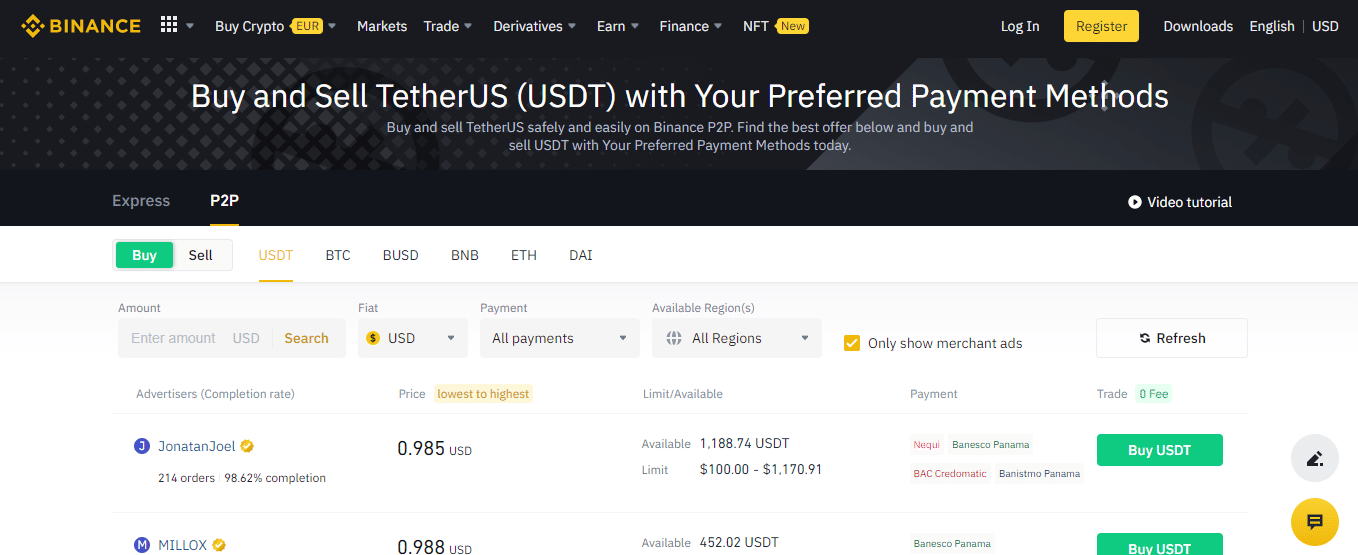
Minimum trades start at $10, and there is no maximum amount. Investors can only buy Bitcoin, Ethereum, Binance Coin, and popular stablecoin USDT on the Binance P2P marketplace. The Binance P2P platform features a filter option that enables users to choose a payment method and specify the amount to trade crypto with. However, trade scams do exist on the Binance P2P platform. A user may claim to have completed the steps to falsify a transaction. Overall, Binance P2P tops this list of the best P2P platforms for crypto.
For more information, read our full review on Binance.
2. Bybit P2P
ByBit is another P2P marketplace worth considering. Launched in early January 2022, Bybit comes with a clean-cut design theme, and the P2P platform is easy to use. All trades can be completed within minutes. This is largely due to its streamlined trading process. The major draw has been its continued addition of new services like crypto margin trading for some users. This has also extended to its P2P platform where Bybit has seen remarkable growth.
-
Trading Fees:
0% (spot), 0.06% / 0.01% (futures)
-
Currency:
USD, EUR, GBP, AUD, CAD, +125 Others
-
Country:
Global (USA not allowed)
-
Promotion:
0% trading fees for 30 days (spot only)
Bybit's P2P marketplace runs on a zero-fee structure. To get started, Bybit requires a minimum starting price of $10, and its Express functionality easily aggregates the best trade and prices in real-time. In terms of assets supported, Bybit has a small shopping window. The platform offers only Bitcoin, Ethereum, and Tether (USDT). However, this does not affect its liquidity level as the platform enjoys massive trading activities.
To make up for this small P2P trade offering, Bybit allows up to 9 fiat trading pairs alongside its major stablecoin offering. These include INR, AUD, RUB, and TWD, all pegged to the USDT token. To buy, users need to select a crypto ad and insert how much they want to buy. The Bybit platform will work according to the preset parameters by the seller and show the buyer how many digital assets they will get in return. Then the buyer can click on the ‘Buy’ button to notify the seller of their interest.
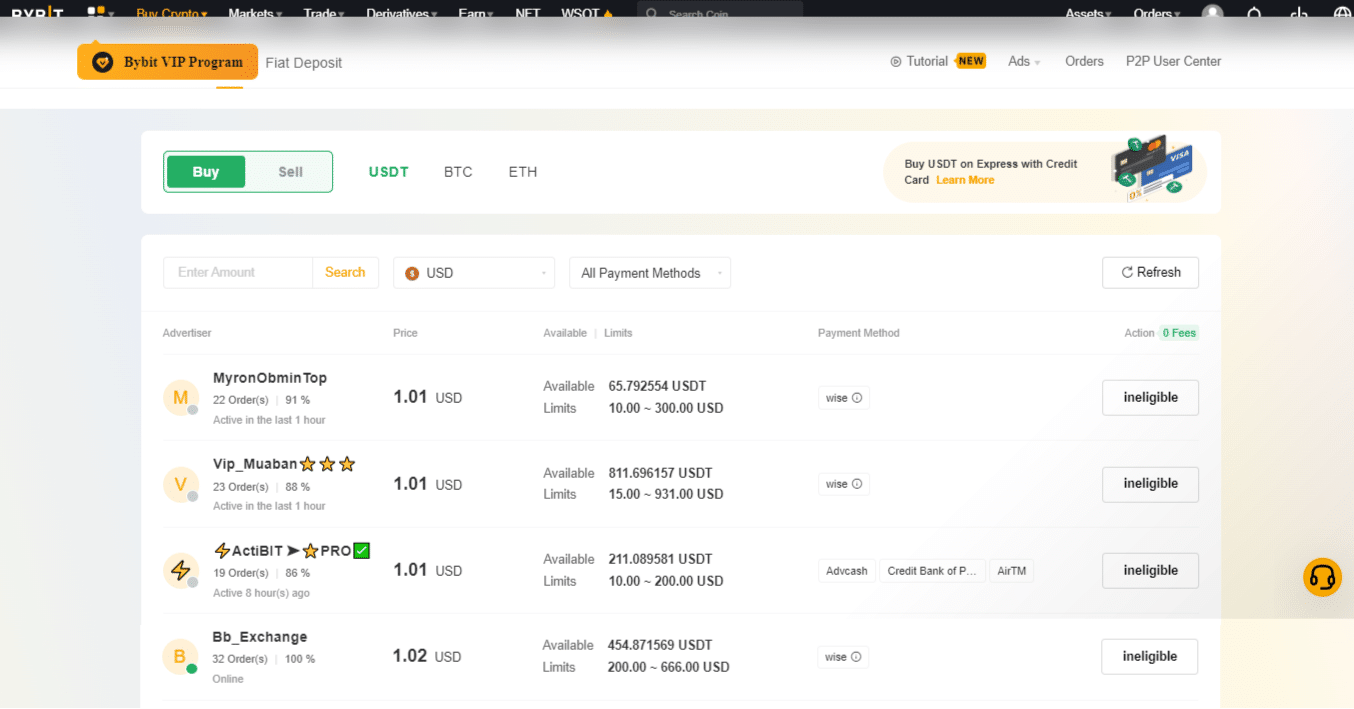
Bybit offers over 80 different payment methods for fluid trade executions, including credit/debit cards, bank transfers, and in-person cash payments. There isn't an option to filter the merchants on Bybit's P2P marketplace compared to Binance. This is more time-consuming to find the best trades based on completion or reviews on Bybit.
Another con with this P2P trading platform is that users can only filter vendors based on their payment methods.
Read our full Bybit review and trade with a referral code to claim a deposit bonus.
3. KuCoin P2P
KuCoin, one of the most popular altcoin exchanges in the digital asset landscape, is another prominent player in the P2P business. The trading platform is reputable for its deep liquidity, and this flows into its P2P service. Launched in August 2020, the KuCoin P2P marketplace has established itself as a major hub for cross-asset trading pairs. At the time of writing, KuCoin is currently the sixth largest crypto platform with over $700 million traded daily.
-
Trading Fees:
0.1%
-
Currency:
USD, GBP, EUR, CNY & 46 others
-
Country:
Global (USA not allowed)
-
Promotion:
Up to 500 USDT in bonuses
KuCoin does not charge transaction fees for customers who trade on its P2P platform. However, the minimum amount tradable is pegged at $20. Traders can conveniently exchange over five digital assets, including industry leaders like Bitcoin, Ethereum, USDC, USDT, and its in-house discount token, the KCS. There are over 20+ payment methods, and transactions are usually completed within minutes. This includes a bank transfer, Payeer, AirTM, ADVCash, Zelle and TransferWise.
Unlike some other P2P crypto exchanges, KuCoin doesn't rank its merchants according to their completion rate. Notwithstanding, there's a currency feature that can be adjusted to view agents offering deals in your local currency. Traders can post trade ads in over 25 fiat currencies available including US Dollars (USD) and British Pounds (GBP).
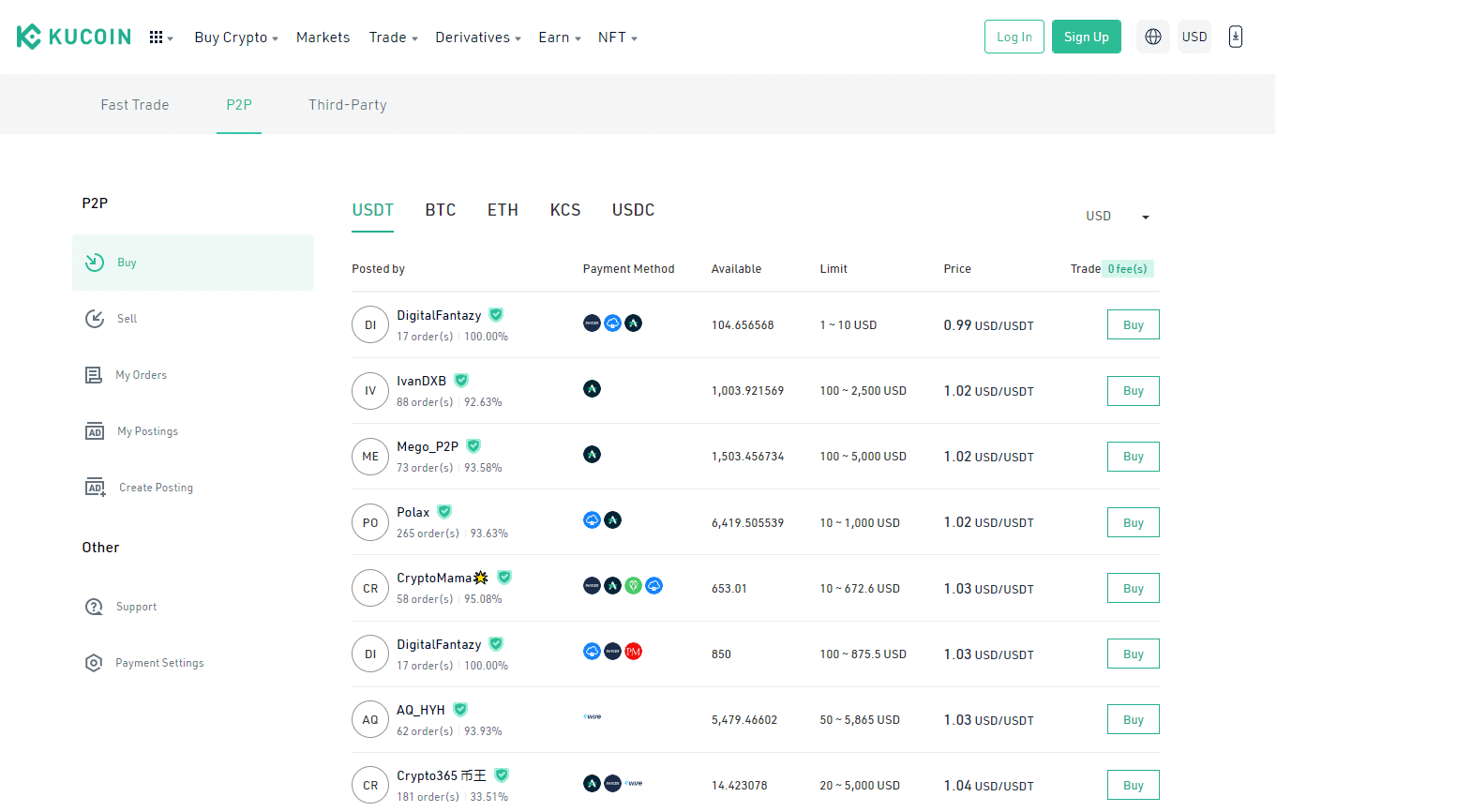
The default currency is set to USD. This can easily be changed to a preferred option. This presents a list of dealers offering P2P trades in that currency which is a useful feature to narrow down the list of buyers and sellers. However, the currency filter can be confusing for some who are new to the platform. In some cases, might be deemed too much of a hassle as the buyer needs to scroll through multiple ad listings before finding the preferred vendor.
However, security on the platform won't be much of an issue as KuCoin performs a rigorous KYC verification procedure before allowing merchants to post ads on the site. Despite this, it's still a bit of a hassle to go through multiple ad listings before finding the vendor with a preferred payment option.
For more information, read our full review on KuCoin.
4. Huobi P2P
Huobi Global launched its peer-to-peer services in August 2021, providing its customers with a means to seamlessly and effortlessly exchange value. Huobi has since become a major player in the P2P niche and a top contender on this list of the best P2P platforms. The pros include its ease of use, no fees, and the least tradable value is set at $100.
-
Trading Fees:
0.2%
-
Currency:
57
-
Country:
Global (USA not allowed)
-
Promotion:
None available at this time
Huobi Global is one of the trading giants in the crypto space. The crypto exchange was launched in 2017 and is also of Chinese descent like Binance. On the rankings for the largest crypto exchange, the Bitcoin trading platform takes the ninth spot at the time of writing according to CoinMarketCap, with significant trading volume on record as well. Huobi’s strong market penetration has been driven by a plethora of industry-leading services, multiple payment methods for flexibility, high liquidity, and fees per trade starting at 0.2%.
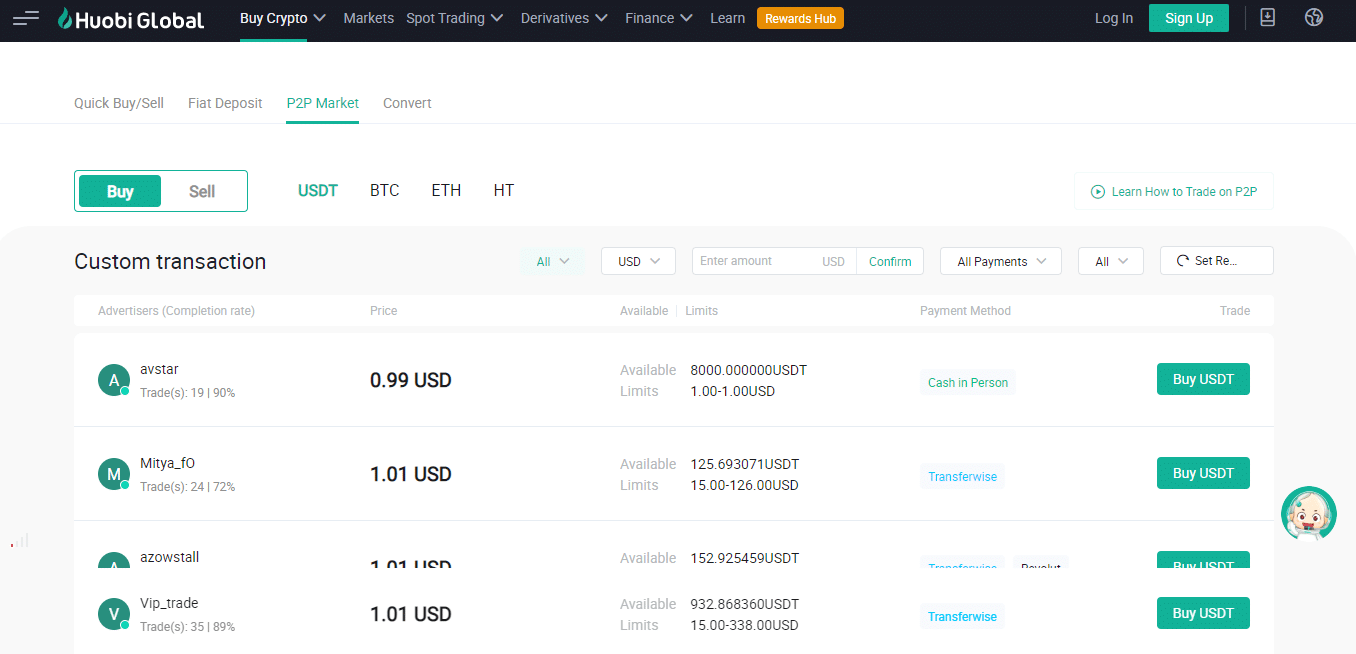
Merchants on the platform can trade up to four digital assets: Bitcoin, Ethereum, Tether, and the Huobi Token (HT). Huobi's P2P platform is quite extensive. The platform features a more advanced sorting system compared to some of the other P2P options above, where investors can filter vendors based on currency, amount, and payment options. Customers can also sort merchants based on reviews and ratings on the platform.
Read our detailed Huobi review for more information.
5. OKX P2P
OKX is a centralized crypto exchange that has made a foray into the P2P arena. The crypto trading exchange offers a sizable amount of digital assets for seamless trading. These include USDT, TUSD, USDC, BTC, ETH, and DAI which is reasonable compared to KuCoin, Paxful, and Huobi. Due to its strong centralized trading environment, the OKX P2P service comes with deep liquidity, allowing users to make deposits and withdrawals without issues.
-
Trading Fees:
0.08% (maker) / 0.10% (taker)
-
Currency:
USD, EUR, GBP, KRW, JPY, RUB, TRY, USH, CAD, AUD & 20 others
-
Country:
Global (USA not allowed)
-
Promotion:
None available at this time
As is the norm, OKX also has an escrow service for the safety of the buyer and seller. Once a buyer initiates a trade with a vendor on the platform, OKX freezes the seller's asset and keeps it in escrow until the seller confirms payment. The payment methods for P2P exchange on OKX vary depending on the user’s region. Users can buy and sell Bitcoin on OKX using their local currencies like the US Dollar. Some of the funding options include ADVCash, Wise, credit/debit cards, PayPal, and bank wire transfers.
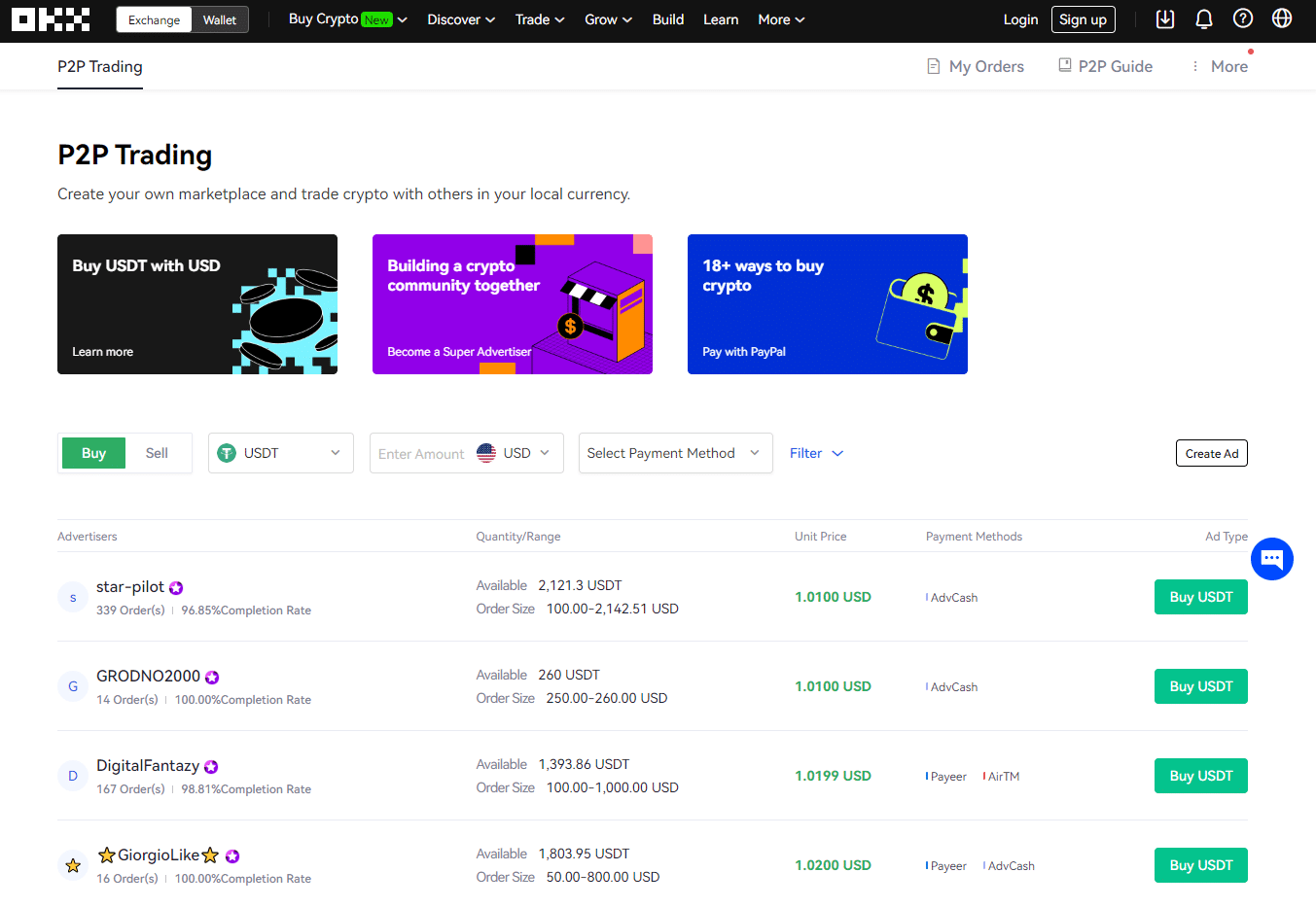
To use the OKX P2P marketplace, a trader needs to complete their KYC Level one and add at least one payment method to their account. The minimum trading amount starts at $20 and there are no fees for using the platform. There are a few disadvantages to OKX's P2P. The most notable was the complete user interface and the filter system doesn't really help to find suitable crypto buyers or sellers.
The best way to navigate the P2P is to scroll through the ads in search of vendors that have completed lots of trades and have a high completion rate. Alternatively, post an ad with the order requirements and wait for someone to trade with which can be time-consuming to find a match.
For more information on the platform, read our full OKX review.
6. Paxful P2P
One major attraction for traders who use Paxful is the ease of access to its marketplace. Traders are not required to create a username or password. They can access the Paxful P2P platform using their email address. Paxful makes this list because it's reputable and reliable with a variety of payment options, however, its major con is the fees for completed transactions.
-
Trading Fees:
Varies on seller
-
Currency:
USD, EUR, GBP, AUD & 40 others
-
Country:
Global (USA allowed)
-
Promotion:
None available at this time
Paxful is one of the most popular peer-to-peer crypto networks for sales and purchases of digital assets. The platform, one of the original P2P marketplaces, has since expanded its services to over nine million users across 50 countries since its launch in 2015. Aside from facilitating trades, Paxful also operates as a digital wallet.
Paxful is focused on facilitating rapid P2P transactions, and it allows users to either browse through crypto advertisements or create their own marketplace. However, the number of supported crypto assets is quite small in our opinion as the platform is focused on providing the highest value for deep liquidity assets. The supported assets are BTC, ETH, and USDT which are too limited.
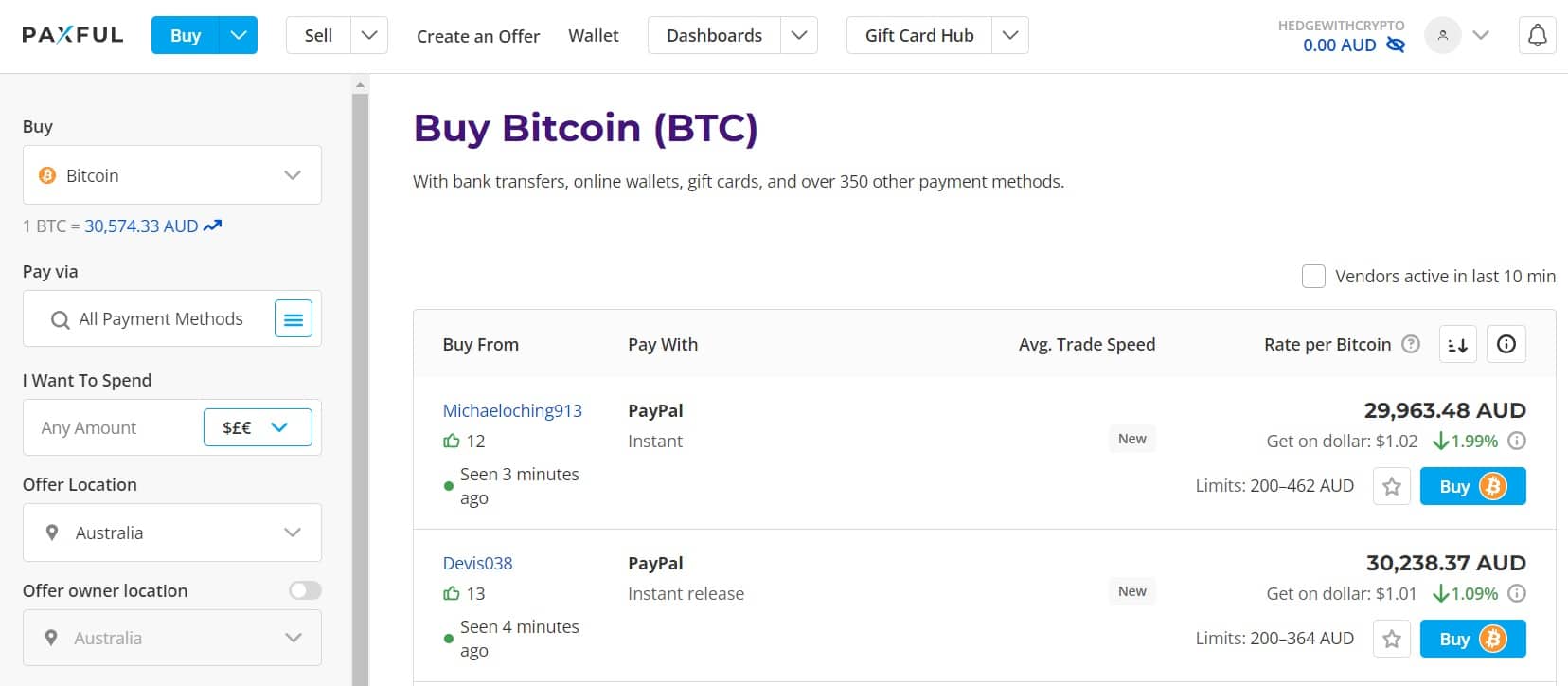
The Paxful interface is streamlined. The filtering system is quite advanced like Huobi. Traders can sort through trade offers based on cryptocurrency of choice, payment method, and location. The platform also has a feature that allows you to sort through offers based on completion speed and offers from verified merchants.
The Paxful marketplace offers over 350 payment methods, including bank transfer, credit/debit cards, and PayPal. Each trader can select their preferred payment method. Paxful takes a nominal fee of 0.5% to 5% for completed sales. The least amount to trade with is $10 – but this still largely depends on the offers available.
To learn more, read our full Paxful review.
7. WazirX P2P
WazirX is a fast-rising Bitcoin trading service based in India. Launched in 2020, the crypto exchange has close ties with the Binance exchange. It principally operates as Binance’s franchise in the Asia market. WazirX has been launching new services in the past year, and its P2P service is a fast-growing service. It comes with an eye-catching clean-cut design interface. The platform has zero fees and claims to have a 100% safety record.
-
Trading Fees:
0.2%
-
Currency:
INR
-
Country:
India
-
Promotion:
None available at this time
WazirX touts itself as the world’s first auto-matching P2P engine, which means it is able to easily match an order to the most relevant result within seconds. This is impressive, and it introduces a whole new landscape to the P2P trading field. Due to its auto-matching engine, WazirX has a transaction record of 19.2 minutes, which is within the transaction speed of the best P2P crypto exchanges. Additionally, all traders on the platform are verified to improve the platform’s aversion to fraudulent users.
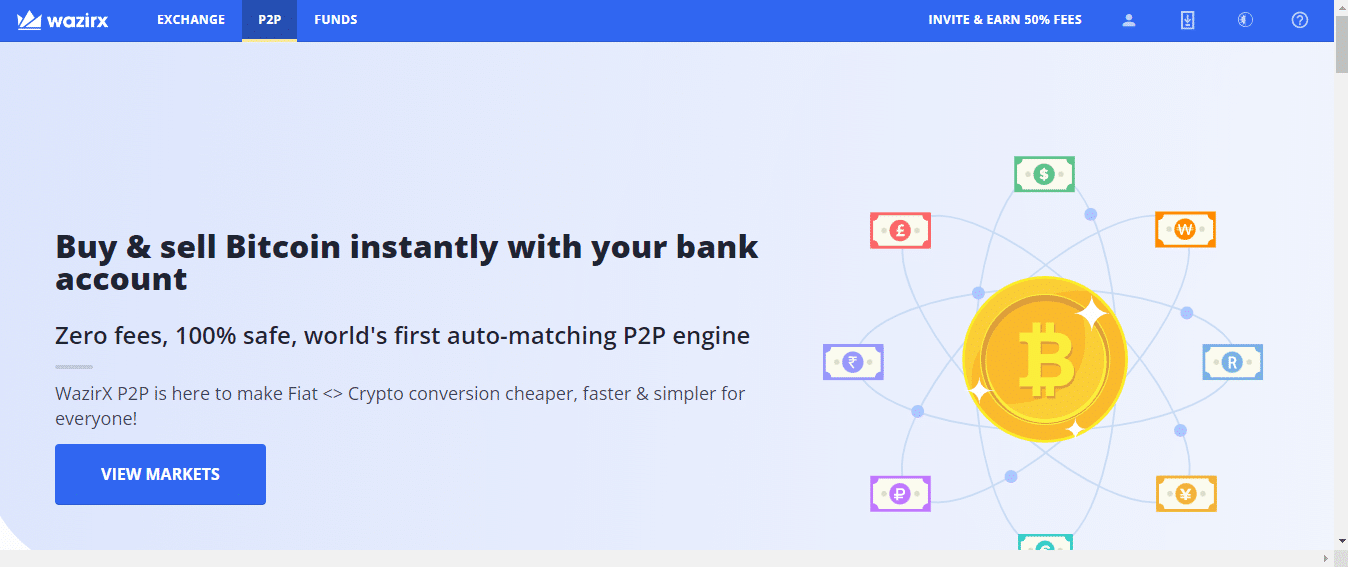
What separates WazirX from some of the other P2P platforms is its use of transaction IDs for large-volume trades. This aids historical referencing, making it easy for complaints to be addressed. This also makes WazirX suitable for users looking to buy large volumes of crypto assets.
The minimum starting price on WazirX for P2P trades is $20 which is a little higher than Binance and Bybit. WazirX supports over 20 solutions, including a bank wire transfer system, credit/debit card, and e-wallet solutions which will cater to most individuals. However, WazirX P2P trades only support the USDT stablecoin, alongside over 8 fiat trading pairs. WazirX offers 2FA and address whitelisting.
To learn more, read our full review on WazirX.
What Is A P2P Exchange?
A P2P exchange, also known as a peer-to-peer exchange is a crypto trading website or app that allows buyers and sellers to exchange crypto without the intervention of a trusted third party. Essentially, only two parties are involved in the financial transaction. A peer-to-peer network is one of the building blocks of the crypto revolution, and several users are turning to the innovative value exchange system. These asset exchange platforms are intrinsically different from their centralized counterparts.
How Does a P2P Exchange Work?
A P2P exchange works as a matchmaker. It provides a trading service where buyers and sellers can meet to complete a trade. Crypto funds meant for the transactions are usually stored in a smart contract-enabled escrow system that automatically disburses once set conditions are executed.
In return, the P2P exchange charges a small fee for facilitating the trade. A more conventional example is the popular Craigslist, which operates similarly. Both buyers and sellers can browse through crypto advertisements or create their own, depending on their needs. Also, P2P cryptocurrency exchanges work with a feedback and rating system, which encourages transacting parties to leave a review of their trading experience with the counterparty. This provides social proof for the merchants and builds trust.
Notable components of a crypto P2P include:
- No middle-man. P2P platforms do not have a trusted third-party involved in transactions. The ripple effect of this is a lower cost for users. With the elimination of the third man, traders can exchange value without incurring fees.
- Simple KYC verification process. Traders also have a more relaxed stance on the verification process. While a traditional Bitcoin exchange requires new users to undergo a strict identification process, a P2P transaction can easily be set up with a more simple ID verification process.
- Choose trading partners. P2P users also enjoy the luxury of selecting their preferred trading partners on the exchange. They can also trade Bitcoin and crypto directly with them instead of relying on an automated trading engine.
- Wide selection of payment methods. P2P platform often details a list of verified merchants offering trades on specific cryptocurrencies, rates, and payment methods. Once a buyer initiates a trade, the seller's funds are transferred to an escrow
- Escrow service. An arrangement where a third party holds the digital assets pending the fulfillment of a contract. The crypto will be released once the seller confirms payment.
Top Features Of A P2P Exchange
When looking for the right P2P platform to buy or sell crypto, these are examples of key attributes that should be researched and considered before creating an account.
- Has a powerful matching engine. P2P exchanges are usually equipped with powerful matching engines. This tracks the user’s region, and aggregates offers available within that region. Also, these engines help filter transactions according to preset parameters and curate high-performing sellers for intending buyers to explore.
- Features multi-layered security. The security of a platform is crucial to its success. P2P cryptocurrency exchanges are known to feature high-end security architecture. Most P2P marketplaces come with industry-leading securities like two-factor authentication (2FA), anti-denial of service (DoS), anti-distributed denial of service (DDoS), authentication layer systems, and SSL implementation, amongst others.
- Uses an escrow protocol. To ensure no party is defrauded, funds meant for the transaction are locked in a smart contract-powered escrow system. This is out of the reach of the buyer and seller. Once a trade is confirmed by both parties, the platform releases the crypto to the buyer. This adds a much-needed layer of protection to this trustless business climate.
- Enforces ID verification for all users. Although the know-your-customer (KYC) process is not a common feature on peer-to-peer cry[to exchanges, both investors and traders need to undergo a form of verification in a bid to prevent scams. However this is not always the case for all P2P platforms. However, verified vendors are always given priority on exchanges.
P2P Exchange Vs Crypto Exchanges: How Do They Differ?
Although both exchanges facilitate crypto purchases and sales, a P2P platform is intrinsically different from its centralized counterpart. Here are a few differences:
1. Decentralized
The most popular P2P crypto exchanges are decentralized platforms by design. The networks on P2P crypto exchanges have a common communication protocol, enabling them to transmit a ton of data instantly in real time. This makes them a hard target to hit by hackers. A centralized exchange, on the other hand, would usually require a physical location to operate. The single point of reference makes them easy targets for malicious actors.
2. No Order Book
Transactions are recorded differently in a peer-to-peer network. Centralized crypto services work with an order book that keeps track of the liquidity of asset purchases and sales. P2P crypto exchanges lack this, as transactions are done on a user-by-user basis. Order books are not required since transactions are settled within a much smaller landscape.
3. Zero Third-Party
While asset trading would normally require a buyer, a seller, and a platform, a P2P exchange eliminates the platform in the circle. Instead, buyers and sellers get to select who they want to exchange value with, at what rate, and their preferred payment method without the need for a third party. This fosters control in the trading experience, allowing users to decide on the best trading experience for themselves.
4. Lower Trading Fees
The upside of only two transacting parties is lower trading fees. Investors who buy and sell crypto on traditional exchanges are known to have multiple fees for facilitating asset purchases and sales. A P2P exchange is different. In most cases, they charge less than a fraction of what a centralized exchange charges. Some of the best P2P crypto exchanges even have zero trading fees.
5. Unsanctioned Transactions
Users that employ centralized exchanges are subject to the whim of that cryptocurrency exchange. A centralized platform may stop all withdrawals, thereby crippling transactions in the event of a liquidity or bankruptcy crisis. A P2P is a decentralized exchange, meaning users have full control of their assets. These funds are usually stored in separate crypto wallets and can be accessed anytime the user wants. A P2P crypto exchange executes transactions without difficulties.
Are P2P Platforms Safe to Use
Most P2P crypto exchanges are built as an extra feature on a crypto trading provider. The regular security protocols available on the main exchange are also available on the P2P marketplace such as 2 Factor Authentication. Alongside this, all buyers and sellers are often verified beforehand. The availability of a smart contract-powered escrow system means users will get value for their intended trades before funds are released. This prevents the likelihood of a Bitcoin scam as it is only when the buyer marks the trade successful that the funds are released to the seller.
Limitations of Using A P2P Crypto Exchange
The major limitation of a P2P exchange is its unregulated system. Most P2P platforms are not supervised by any financial watchdog and operate without any regulatory oversight. This indicates that in the event of a financial emergency, users are not protected by the necessary financial umbrella.
Another issue with a P2P exchange is its ability to attract fraudulent individuals. Due to the lax regulatory landscape, scammers can defraud users of their funds and crypto assets and easily get away with it. Traders also have to contend with slower trading speeds and a lack of privacy, as you'd be dealing with third parties as against a trading exchange.
How To Use P2P Exchanges To Trade Bitcoin & Crypto
Crypto users can easily complete their first trade using the Binance P2P platform. To do this, follow these detailed steps.
1. Create an Account on the Binance Website and Verify ID
Open an individual account on Binance. Click on the ‘Register’ button and insert an email address. Then follow the on-screen prompts to verify a mobile number and complete the steps. Next, investors should verify their ID to unlock the P2P feature. To do this, click on the profile icon and the ‘Verify’ button to upload a driver’s license or national ID card. Then complete the face verification process.
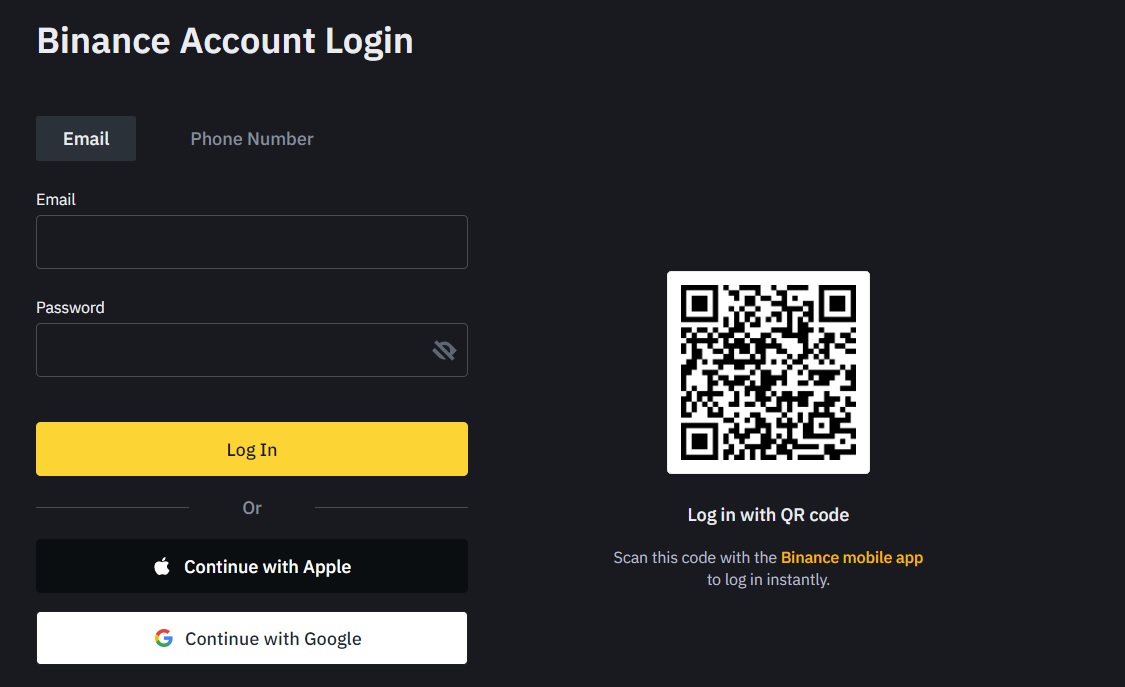
2. Select ‘Funding’
The P2P functionality should be ready for use now. Users can click on the ‘Wallet’ icon to open their account transactions. Then, click on ‘Funding’ and ‘P2P’ to open up the platform. Users will be shown a slew of offers and can either filter their search or browse manually through all options. Binance P2P allows users to select their preferred payment method and the amount they intend to pay for the projected service.
The auto-matching engine will search through all relevant crypto adverts to pull up the offers that meet the preset parameters and show them to the user. Once the user identifies their ideal seller, they can proceed to the next step.
3. Select a P2P Seller
Once the rates and payment methods offered by the seller meet the stipulated metrics, a user can proceed to select their preferred seller. The platform will display all relevant information about the seller and their expected turnaround rate for trades. Users also have access to a chat functionality that allows the buyer and seller to message one another.
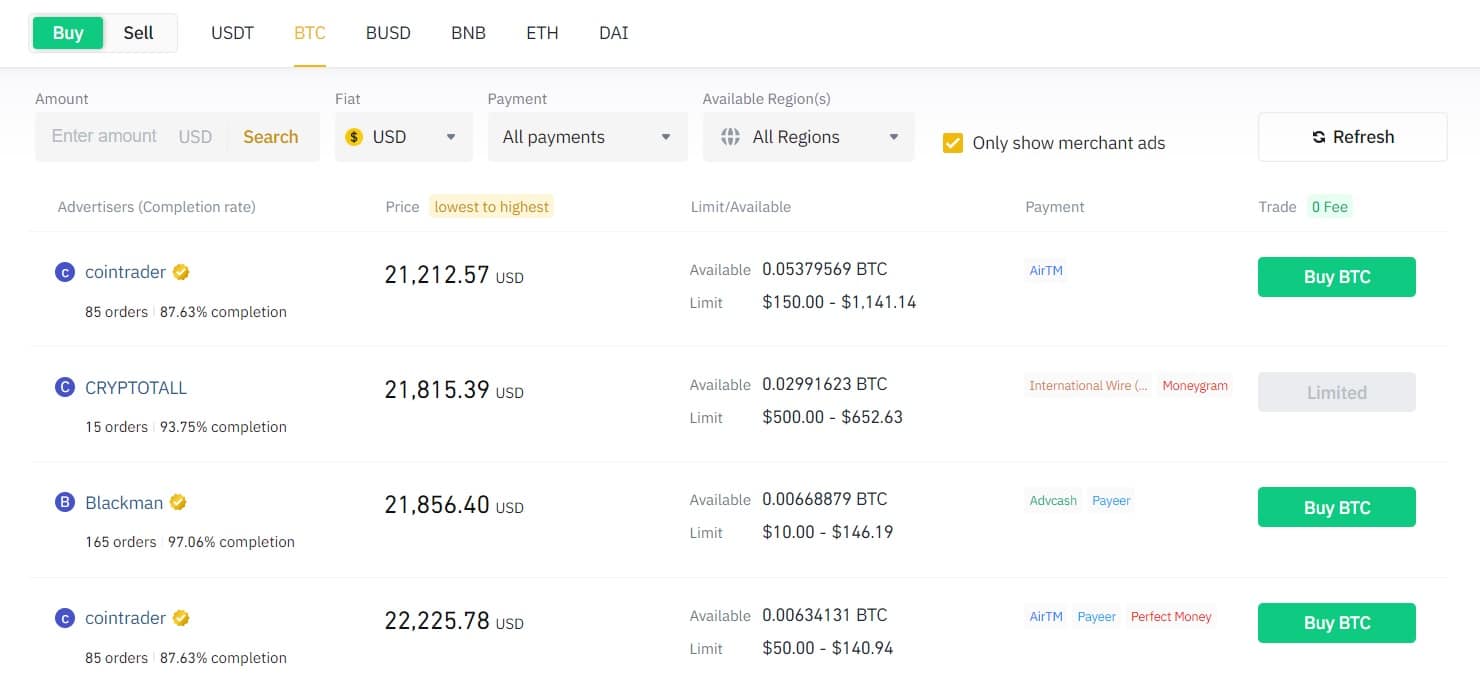
4. Wait for Crypto to Drop
The trade can be executed once a buyer agrees on the rates at which the seller is willing to trade Bitcoin or other altcoins. A timer is set and the seller is expected to fulfill the trade within that window or the trade is canceled. Once the crypto asset is forwarded, the seller ticks the box and notifies the buyer.
5. Confirm Receipt
An email will be automatically forwarded to notify the buyer about the release of the digital assets. The user will have to confirm receipt and fill in a six-word verification code simultaneously forwarded to their email address and mobile number. To release the funds, the user clicks on ‘Payment Received’ and the trade is concluded.








